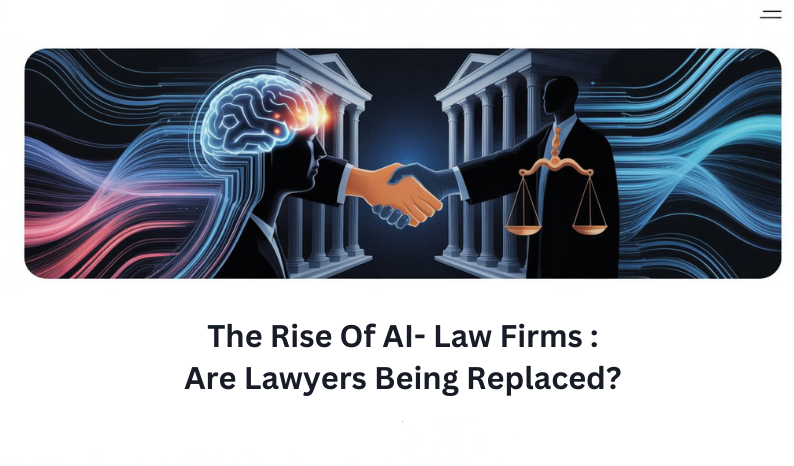
Introduction: The Rise of Lawyer Artificial Intelligence
Artificial Intelligence (AI) has changed almost every industry, from health care to finance, and now it is revolutionizing the legal industry too. Many people fear AI, they shouldn’t. Instead of taking over human jobs, lawyer artificial intelligence is empowering legal professionals to become more efficient, strategic, and client-focused than ever before.
This blog explores how artificial intelligence for law firms is shaping the future of legal services, what benefits it offers, and whether we should really worry about lawyers being replaced by robots in the age of AI lawyers.
1. What Is Lawyer Artificial Intelligence?
Lawyer artificial intelligence (AI) refers to the use of machine learning, natural language processing, and automation technologies in legal processes. Instead of manually completing repetitive work, attorneys now use artificial intelligence attorneys, intelligent tools designed to assist with legal research, document drafting, case analysis, and compliance checking.
These AI lawyer systems don’t replace human judgment, they enhance it. By combining the precision of machines with the expertise of lawyers, lawyers and AI work together to ensure better accuracy, efficiency, and client satisfaction.
For instance, AI can analyze massive amounts of legal case law data in minutes, something that would take humans weeks. Similarly, legal artificial intelligence tools help lawyers identify precedents, predict outcomes, and manage legal documents efficiently.
2. The Growth of Artificial Intelligence in the Legal Industry
The artificial intelligence legal industry is expanding rapidly as law firms look for better ways to manage workloads, reduce costs, and serve clients faster. AI for law firms is being applied in multiple areas such as:
- Legal document review and management
- Case prediction and outcome analysis
- Contract drafting and automation
- Billing, financial tracking, and client management
- Real-time legal research assistance
Recent studies reveal that over 60% of modern law firms now use some form of AI in legal industry operations. From AI lawyers handling data-heavy litigation support to artificial intelligence attorneys managing case summaries, technology is now an invaluable partner to every law office.
3. Key Benefits of AI for Law Firms and Lawyers
Adopting lawyer artificial intelligence brings a wide range of advantages for legal professionals and their clients alike
a. Improved Legal Research
Traditional legal research takes hours of manual reading. AI tools, however, can scan millions of legal documents in seconds to find relevant judgments, statutes, and references. This gives lawyers powerful, data-driven insights for every case.
b. Efficient Document Management
Legal artificial intelligence enables automated document management, drafting contracts, flagging compliance risks, and detecting inconsistencies. This minimizes errors and improves workflow efficiency in every law firm.
c. Predictive Case Analysis
AI algorithms analyze previous judgments to forecast potential case outcomes. By comparing similar lawyer cases, attorneys can build stronger strategies for litigation and arbitration..
d. Better Case Management
AI-powered tools streamline case management by organizing files, tracking court dates, and automating reminders, ensuring that lawyers never miss critical deadlines.
e. Enhanced Legal Consultation
AI-based chatbots and AI legal assistants can manage client inquiries, collect case details, and provide instant answers, allowing lawyers to focus on deeper legal consultation and strategic work.
4. Will Lawyers Be Replaced by AI or Robots?
One of the biggest concerns remains: Will lawyers be replaced by AI?
The answer is, no, but their work will evolve.
While artificial intelligence attorneys can perform repetitive administrative work, they cannot replace human reasoning, ethics, or empathy. These are core to the legal profession.
Even if people wonder “will lawyers be replaced by robots?” The truth is that lawyers and AI are partners, not competitors. AI complements legal expertise rather than replacing it.
In fact, artificial intelligence for law firms is creating new opportunities, helping lawyers innovate, serve clients better, and grow their firms efficiently.
5. Top Advantages of Using AI in Legal Practice
Here’s how lawyer artificial intelligence is redefining modern law firms:
1. Accuracy and Speed
AI performs complex tasks with exceptional precision, minimizing human errors and delivering results faster.
2. Cost Efficiency
By automating repetitive workflows, AI for law firms helps reduce operational costs and makes legal services more affordable.
3. Smarter Decision-Making
AI-powered analytics uncover trends in legal case law, helping lawyers make informed, data-driven decisions.
4. Stronger Data Protection
Advanced AI systems use encryption and monitoring tools to safeguard sensitive legal documents and client information.
5. Enhanced Client Experience
AI improves transparency and speed in legal consultation, creating better client satisfaction and long-term trust.
6. The Human Side of Lawyer Artificial Intelligence
Although many people fear AI, they shouldn’t. The technology doesn’t replace lawyers; it empowers them. Lawyer artificial intelligence helps attorneys focus on what truly matters — building relationships, creating strategies, and delivering justice.
By automating research and documentation, lawyers get more time for creative and analytical thinking, improving both productivity and work-life balance.
Moreover, artificial intelligence for law firms ensures fairness and accessibility. Smaller law offices can now compete with larger firms using the same document management systems and records management software, creating a more balanced legal ecosystem.
7. Real-World Examples of AI in Law Firms
Several global law firms already use AI in the legal industry:
- Baker McKenzie uses AI for contract analysis and risk management.
- Allen & Overy introduced “Harvey,” an AI lawyer platform for research and documentation.
- AkraLegal, a growing legal tech brand, is integrating AI for law firms to enhance case management, financial management, and client engagement.
These examples prove that artificial intelligence legal industry innovations are accessible not just to global firms but also to regional and boutique practices..
8. The Future of Lawyers and AI
The next decade will see lawyer artificial intelligence become a standard part of every law firm. From document control to court management services, AI will handle data-driven tasks, while lawyers provide judgment, ethics, and empathy.
As artificial intelligence for law firms evolves, the profession must evolve too. Lawyers who adapt to AI will lead the way, while those resistant to change may fall behind.
Conclusion: Lawyers and AI- A Powerful Partnership
The rise of lawyer artificial intelligence doesn’t mark the end of the legal profession, it marks a new beginning. Lawyers won’t be replaced by AI; they’ll be empowered by it.
AI offers smarter, faster, and fairer solutions, enabling lawyers to handle more cases, provide better legal consultation, and deliver justice with precision and speed.
So, the next time someone asks, “Will AI replace lawyers?” Remember, AI isn’t here to compete. It’s here to collaborate. Together, lawyers and AI will define the future of modern legal practice.




